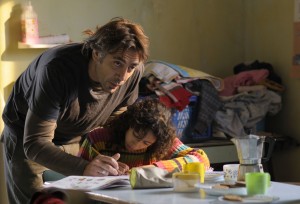
In “Biutiful,” Javier Bardem plays a Barcelona criminal struggling with a number of personal and spiritual crises.
In “Biutiful,” Uxbal (Javier Bardem) is an enigmatically prominent figure in Barcelona’s underworld. He’s something like a criminal mediator/social worker who’s involved in supplying illegal street vendors and importing undocumented Chinese workers to two uncaring sweatshop managers (who, by the way, are gay lovers).
Meanwhile, on the home front, the impoverished Uxbal is trying to care for his two young children while also dealing with the return of Marambra (Maricel Álvarez), his bi-polar, recovering addict ex-wife (who, by the way, is secretly sleeping with Uxbal’s brother, who has drug problems of his own).
Uxbal is also diagnosed with terminal cancer, and his doctor tells him that he has mere months to live. Oh, and he also has some kind of telepathic ability that allows him to communicate with the recently deceased, which he uses to earn some extra money on the side. Oh, and he’s pissing blood, too. Quite frequently.
Got all that? All right, well don’t worry, I haven’t spoiled anything about “Biutiful:” all of these complications are set in motion within the first act, and the film spends the remainder of its time juggling each fiasco with tactful disorder.
The film was directed and co-written by Alejandro González Iñárritu, whose previous films (“Amores Perros,” “21 Grams,” “Babel”) worked with interconnected storylines, ensemble casts and globe-trotting locales. “Biutiful” represents a change, of sorts, in that it is a (mostly) linear story fixated on one character in one place. Meanwhile, that doesn’t stop Iñárritu from giving Uxbal’s story the same muddled, oppressive treatment as any of his other films.
At times this film reminded me, perhaps inappropriately, of the Coen Brothers’ “A Serious Man,” a modern day Job story that found twisted humor in the ridiculous whirlwind of catastrophes that befell its hero. But “Biutiful” is much more self-important than self-aware — it’s a film that bites off a lot, and just keeps on chewing for 140 minutes.
The narrative’s haywire plot threads never really gel, but that’s not to say the film doesn’t work — in the long run, somehow it does. “Biutiful” is a grueling, sometimes overbearing experience, but it certainly sticks in your head, however fitfully. Uxbal’s downward spiral is too often represented with scenes of bleak repetition — his numerous disputes with his ex-wife and the sweatshop owners, his delirious wandering of Barcelona’s nightmarish dives — but his agony also comes through in more poetic and dreamlike passages.
There’s a scene following a particularly horrific mishap in which Uxbal wanders the streets at night and is overtaken by the sight of countless black birds flocking away from him — it’s the film’s most fantastical, and memorable, depiction of his psyche. The story is also bookended by a haunting beyond-this-world scene that’s genuinely touching — at its conclusion, “Biutiful” really does feel like the wise, majestic movie it keeps setting itself up to be.
It’s Bardem, though, that really carries everything through, as he’s the only truly unifying force in this convolution. Bardem won an Academy Award three years ago for portraying a monotone, emotionless serial killer, but in this role has brought “Biutiful” some of its own unexpected Oscar attention — he runs the emotional spectrum through and through.
Uxbal is introduced in unrest, and the narrative never stops immersing him deeper into it — this is a psychologically exhausting role, and Bardem excels at burrowing into the character’s darkest corners. It’s a challenge to think of Uxbal as a “good” man — his job often brings the film down to its lowest, dingiest points — but he remains sympathetic throughout the worst parts of his ordeal. The narrative’s only bright spots come when Uxbal is shown as a caring, afflicted family man. Whether pretending to give his children elaborate meals out of a cereal box or making a desperate final attempt to reconnect with his ex-wife, his fatherly struggles illuminate almost everything else in the story.
Throughout this ugly story, Uxbal stands as a man trying to keep his morality and sanity in check, against all odds. While sitting through “Biutiful,” you’ll understand those feelings all too well.
Grade: B+
Silverstein is a member of the class of 2013.





